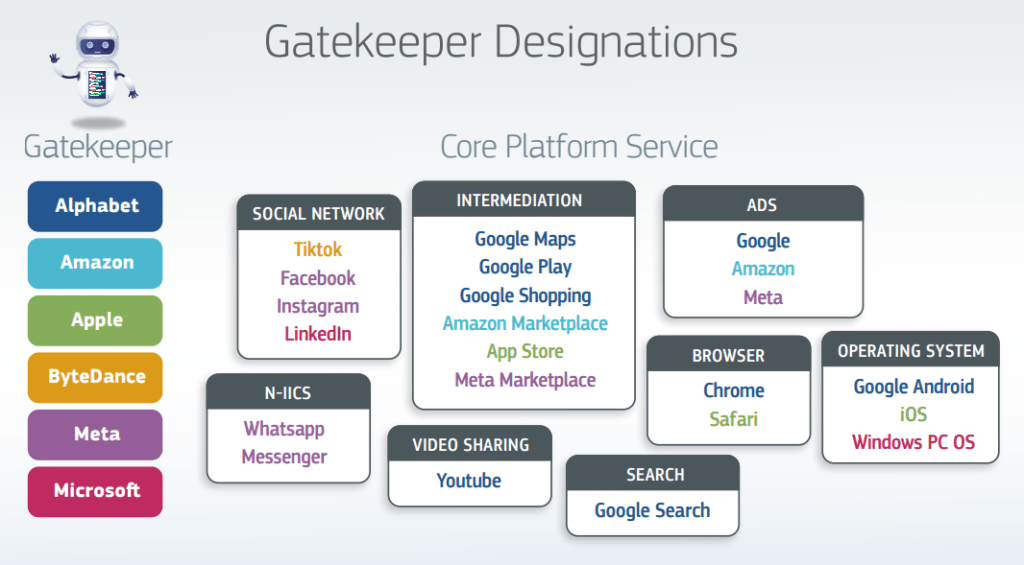The European Union has now named the six tech giants whose services will be subject to the Digital Markets Act antitrust law, with Apple as one of the so-called “gatekeepers.” It’s been confirmed that the App Store is subject to the law, while the status of iMessage remains under investigation.
In total, some 22 services operated by the the six companies are deemed sufficiently influential to be covered by law …
The Digital Markets Act (DMA)
The DMA is a piece of antitrust legislation aimed at tech companies. The goal is to increase competition in the sector by removing some of the advantages held by tech giants.
The thinking is that when you reach a certain size in the market, you can effectively use your market dominance to make it very hard for smaller companies to compete. In particular, tech startups can be effectively locked out of some markets, simply because the established players have such a huge advantage. The EU wants to create a more level playing field.
We’ve previously summarized the initial uncertainty over whether Apple would be affected by the DMA, before it was last year decided that it would indeed fall under the scope of the law – though whether this would apply to the App Store, iMessage, or both, was unclear.

App Store is affected; iMessage is under investigation
The EU has now named the six companies impacted by the law, and confirmed that Apple is one of them. iOS, the App Store, and Safari are all listed for Apple, but iMessage is not.
Before the companies and services were named, each of them was given the opportunity to make the case on why their services should not be covered by the DMA. Apple didn’t argue over the App Store, but did so over iMessage, claiming that the messaging service doesn’t have enough users.
The EU has agreed to defer the decision pending the outcome of an investigation into user numbers. The threshold set by the law is a total of 45 million monthly active users across the 27 EU countries. Apple claims to have fewer than this, and will now be obliged to reveal the actual numbers to substantiate this claim.
What action must Apple take?
App Store
As a minimum, Apple must allow developers to use third-party payment platforms for app sales, and in-app purchases. However, it seems more likely that it will need to permit third-party app stores to fully comply with the DMA.
We’ve known since late last year that the company has teams working on this.
In response to looming regulations in the European Union, Apple has software engineers and services employees working on a project to “allow alternative app stores” on the iPhone and iPad.
The company is reportedly dedicating a “significant amount of resources to the companywide endeavor.”
“As part of the changes, customers could ultimately download third-party software to their iPhones and iPads without using the company’s App Store,” the report explains.
Apple will have a maximum of six months to comply.
iMessage
Where messaging services are concerned, the key focus of the DMA is to allow messages to be sent between competing services – known as messaging apps interoperability.
For example, an iMessage user should be able to send a message to a WhatsApp user, and vice versa.
One way for Apple to comply would be to adopt an existing interoperability standard known as rich communication services, or RCS. iMessage is already compatible with plain text messages, and RCS is essentially the next generation of text message. It is already supported by Google and others.
Apple is reluctant to do this, as it has long regarded iMessage as one of the key benefits of iPhones.
However, no action is required by Apple at this point, pending resolution of the user numbers.
iOS and Safari
The listing may potentially impact the default apps Apple installs on iPhones before they are sold, and the fact that competing browsers are forced to use WebKit, so are unable to offer greater speed or functionality than Safari. But the exact requirements here are likely subject to clarification.
9to5Mac’s Take
At this point, it seems all but inevitable that Apple will have to allow third-party App Stores. The practical impact of this may be limited, as it seems likely that most users would continue to buy through Apple’s own store, for the peace of mind this offers.
iMessage interoperability will depend on the numbers. While it might seem inconceivable that Apple could have fewer than 45 million active users across the 450M people in the European Union, the company must have some basis for making this claim.
It is the case that WhatsApp and Facebook Messenger are both very popular messaging services across the EU (both are named in the legislation), so this may enable Apple to prove its point; we’ll have to see.
Photo: BoliviaInteligente/Unsplash
FTC: We use income earning auto affiliate links. More.


